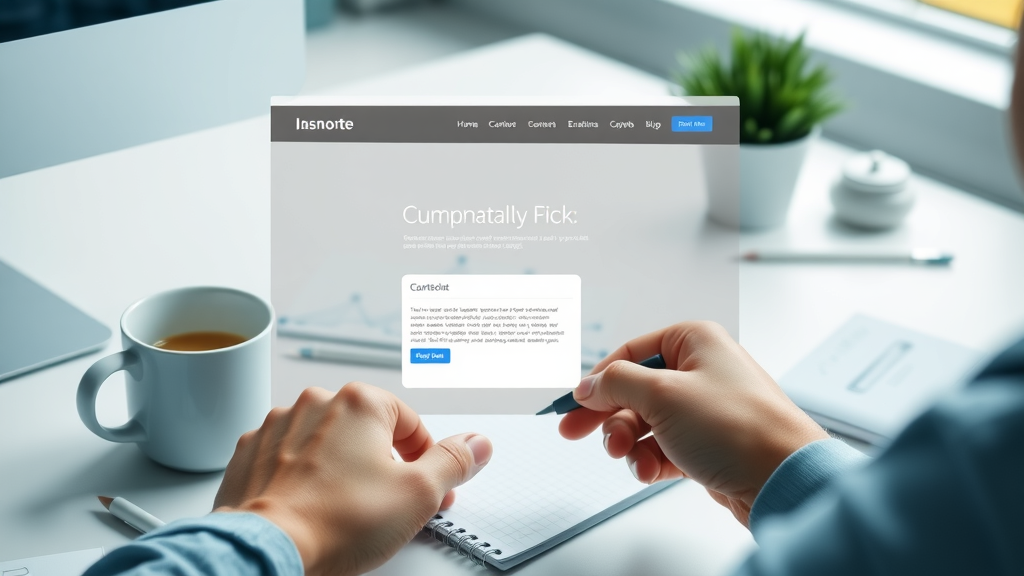Harness the Power of Digital Marketing for Small Businesses: Surprising Insights to Boost Growth
- Did you know that 70% of small businesses fail to fully leverage digital marketing strategies despite their proven ability to drive revenue? This article will uncover the untapped secrets that can transform your marketing efforts and help small businesses build a robust online presence.

Empowering Success: What You Will Learn About Digital Marketing for Small Businesses
- Core digital marketing strategies tailored for small business growth
- How to build a compelling online presence for small businesses
- Actionable tips for social media marketing, content marketing, and search engine optimization
- Data-driven examples and proven marketing tactics
- Expert advice on maximizing your marketing budget for optimal effectiveness
Understanding Digital Marketing for Small Businesses

What is Digital Marketing for Small Businesses? A Comprehensive Overview
Digital marketing for small businesses uses online platforms to connect with potential customers, grow your business, and build a strong online presence. It covers a range of activities, including social media marketing, email campaigns, content marketing, and search engine optimization (SEO) . Every small business has unique products or services, so digital marketing strategies should be tailored to reach the right target audience and boost engagement.
Unlike traditional marketing, which relies on flyers, billboards, or local ads, digital marketing leverages tools like websites, social media platforms, and search engines. This shift allows small businesses to reach local and global audiences efficiently, often with a smaller marketing budget. Whether you run a local bakery or an online shop, having a clear digital marketing strategy can boost your visibility in search results and attract more potential customers.
Digital marketing makes it possible to interact with your target audience in real-time, build brand loyalty through ongoing engagement, and monitor what’s working with detailed analytics. This insight sets small businesses up for long-term success and helps you stay ahead in a crowded digital marketplace.
Key Benefits of Digital Marketing for Small Businesses
Implementing digital marketing strategies can transform a small business in several compelling ways. First, it levels the playing field with bigger companies—thanks to online marketing, you can reach the same audiences at a fraction of the cost. Effective digital marketing puts your brand, products or services , and promotions directly in front of the people most likely to buy from you.
Another important benefit is the ability to measure results instantly. You can track how many people view your website, follow your posts, or subscribe to your email list and use this data to test and improve your marketing efforts. This data-driven approach helps you refine your marketing strategy, focusing on tactics that deliver the best return on investment and helping you grow your business efficiently.
“ Digital marketing has democratized business growth. Small businesses now access the same markets as giants. ” – Industry Expert
Crafting a Winning Marketing Strategy for Small Businesses

Identifying Your Target Audience for Effective Marketing Efforts
A successful marketing strategy for small businesses always starts with understanding your target audience . Knowing who your ideal customers are—their age, interests, location, and buying habits—enables you to tailor your marketing efforts for maximum impact. Taking time to create customer personas helps you speak directly to your audience’s needs and pain points, setting your business apart from the competition.
Use data from your website analytics, sales records, and even social media feedback to identify key characteristics of your audience. Remember, not everyone is your customer: focusing on the most relevant media platforms and key search terms will help you attract those most likely to interact with your brand and become loyal customers.
By targeting your digital marketing towards a specific audience, you can optimize your marketing budget and avoid wasting resources on uninterested groups. This targeted approach leads to more qualified leads, increased sales, and greater return on investment for every marketing dollar spent.
Building a Results-Driven Marketing Strategy for Small Businesses
Developing a results-driven marketing strategy is essential for small businesses looking to maximize growth. Start by assessing your business goals—is your aim to increase foot traffic, drive online sales, or build a strong online presence ? Once your objectives are clear, you can focus on strategies that align with these goals while tapping into the power of digital marketing.
An effective strategy should include a mix of digital marketing tools such as content marketing, SEO, social media marketing, and email campaigns. Establish benchmarks for success, like monthly website visitors, engagement rates, or sales conversions, and track them over time. Doing so gives you the information needed to refine your tactics, adjust your marketing budget, and outperform your competitors.
- Set clear digital marketing objectives aligned with your small business goals
- Conduct competitor research to refine your strategy
- Allocate your marketing budget efficiently for maximum ROI
| Marketing Type | Reach | Cost | Tracking | Flexibility |
|---|---|---|---|---|
| Traditional Marketing | Local/Regional | High | Hard to measure | Limited |
| Digital Marketing | Global/Targeted | Low - Medium | Detailed analytics | Highly adaptable |
Optimizing Your Online Presence for Small Businesses

Website Essentials: Building Credibility and Conversion for Digital Marketing
Your website is the backbone of your online presence —it’s often the first interaction potential customers have with your brand. A well-designed, mobile-friendly website builds credibility and increases conversion rates. Key elements include clear calls-to-action, easy navigation, contact forms, and fast-loading pages; these features make it simple for visitors to learn about your products or services and take action.
Consider adding a blog post section to share news, updates, or helpful tips related to your field. This not only improves your search engine rankings but also positions your business as an expert in your industry. Don’t forget testimonials or reviews to provide social proof, which is especially important for small businesses looking to earn trust and boost sales.
Regular updates and a fresh look will help your small business stand out in search results, build customer confidence, and ultimately drive conversions. Investing in your web presence is an investment in your business growth.
SEO Strategies: Search Engine Optimization for Small Businesses

Search engine optimization (SEO) is critical for small businesses hoping to rank higher in search results and attract new customers. SEO involves optimizing your website’s content, structure, and technical elements so that search engines like Google can find and rank your site for relevant search terms. This process includes keyword research, title/meta tag optimization, and improving your site’s speed and mobile-friendliness.
Why is SEO a top digital marketing strategy? When your website appears at the top of search results, you gain credibility and visibility, drawing more targeted traffic to your business. Regularly publishing optimized blog posts and using local keywords improve your chances of being discovered by potential customers searching for your products or services .
SEO also helps you stay competitive—most consumers research a business online before making a purchase, and a well-optimized site ensures that your small business is seen as a top contender in its niche.
Local Search Engine Optimization Tactics for Small Business Success
Local SEO is a specialized strategy within digital marketing for small businesses, focusing on reaching customers in your immediate area. By optimizing your online listings and encouraging local reviews, you can increase your chances of showing up in Google’s “local pack,” the map and business listings displayed for location-based searches.
- Claim and optimize your Google My Business listing
- Use targeted keywords relevant to small businesses
- Encourage reviews and optimize for mobile search
Mobile devices account for the majority of searches for local businesses, so it’s essential to ensure your website is mobile-friendly and your address, hours, and contact information are always up to date. Responding to reviews and engaging with your local audience builds a loyal community and positive reputation.
Harnessing the power of local SEO not only drives foot traffic to physical locations but also positions your small business at the top of search results for people nearby who are actively seeking your product or service .
Leveraging Social Media Marketing for Small Businesses

Choosing the Right Social Media Platforms for Your Digital Marketing Efforts
The world of social media offers a wealth of opportunities for small businesses to engage with their target audience, but success starts by choosing the right media platform . Not all social media platforms offer the same reach or cater to the same demographics. For example, Instagram and TikTok work well for visually driven brands, while LinkedIn is perfect for B2B connections and professional content marketing .
Assess your products or services and research where your customers spend their time online. Focus on two or three platforms that align with your business goals to avoid spreading your marketing budget too thin. By mastering the nuances of your chosen platforms, you’ll create impactful content and interact more effectively with potential customers.
Always keep in mind your audience’s preferences—using surveys and social media analytics can give further insights into which media platforms will help you expand your online presence most efficiently.
Engagement and Content: Building Brand Loyalty on Social Media Platforms

The key to lasting success with social media marketing is building real connections with your community. Consistent, engaging content—whether it’s behind-the-scenes looks, tutorials, promotions, or interactive polls—keeps your followers interested and encourages them to share your brand with others. Over time, this leads to increased loyalty, more sales, and amplified brand awareness.
Engage directly with your audience by responding to comments, starting conversations, or sharing user-generated content. This genuine interaction creates a sense of belonging and turns casual followers into passionate brand advocates. Don’t forget to analyze what performs best so you can refine your strategy for even better engagement.
“ Successful social media marketing is about creating real conversations around your small business brand. ” – Marketing Expert
Content Marketing Strategies for Digital Marketing in Small Businesses

Developing Compelling Content for Your Target Audience
Content marketing is at the heart of effective digital marketing for small businesses . Compelling content helps answer audience questions, addresses pain points, and showcases your expertise. Start by understanding what your target audience cares about—common challenges, industry news, or creative ideas related to your products or services.
Create a variety of content formats, from well-written blog posts and infographics to engaging videos and podcasts. Each piece should provide unique value and keep your audience coming back for more. High-quality, engaging content also supports your SEO efforts by attracting backlinks and giving search engines more reasons to rank your site higher in search results .
Plan your content calendar around seasonal events, customer questions, or new service launches to maximize relevance and customer interest.
Repurposing and Distributing Content Across Media Platforms
Small businesses often have limited resources, so repurposing high-performing content across multiple channels is a smart strategy. Turn a popular blog post into a series of social media updates, an infographic, or a short video. This approach amplifies your reach while reinforcing your brand message.
Distribution is as important as content creation. Post your work on your website, share it via email newsletters, and spread it across the most relevant media platforms for your audience. Guest posting on other blogs or collaborating with industry influencers also helps build authority and brings new visitors to your website.
- Start a blog targeting small business pain points
- Use infographics and videos for increased engagement
- Leverage guest posting to build authority
Remember, tracking engagement stats and audience feedback will refine your content strategy continually for even better results.
Unlocking the Potential of Email Marketing for Small Businesses
Building and Segmenting a Profitable Email List

A strong email list remains one of the most valuable assets in digital marketing for small businesses. Collecting emails from website visitors, loyal customers, and social media followers allows you to send personalized offers, updates, and valuable content right to their inboxes.
Segment your email list based on customer interests, location, or buying behaviors. Segmentation ensures you deliver the most relevant messages and increases your open and click-through rates. Start by offering incentives for sign-ups, such as discounts or useful resources, to grow your list quickly and ethically.
Continuously clean and update your email list to maintain high deliverability and keep communication tailored and effective.
Crafting High-Converting Marketing Campaigns Using Email Marketing
- Personalization strategies for small business emails
- Automation tools to streamline campaigns
- Measuring open and click-through rates for better results
Effective email marketing goes beyond simply sending a monthly newsletter. Use personalization strategies like including recipient names or suggesting products based on past interactions. Automation tools help schedule welcome emails, abandoned cart reminders, and birthday offers—saving you time and increasing your campaign’s impact.
Track important metrics such as open rates, click-through rates, and unsubscribes to see what content resonates with your audience. Continuous testing of subject lines and calls-to-action helps you refine your email marketing strategy and deliver campaigns that truly convert.
Optimizing Marketing Budget for Small Businesses

Cost-Effective Digital Marketing Solutions for Small Businesses
Managing a small business marketing budget can seem challenging, but digital marketing offers multiple cost-effective solutions. Free or low-cost tools like Google My Business, social media platforms, and basic email campaign managers make it possible to start with limited resources. Prioritize tactics that deliver the highest ROI—such as SEO, content marketing, and referral campaigns.
Consider leveraging partnerships with other local businesses for co-marketing efforts, or tap into user-generated content to expand your reach without extra spend. Regularly review expenses against results so you can make informed decisions about where to invest more or cut back, ensuring you maximize every marketing dollar.
“ Small businesses can achieve outsized results with a carefully managed digital marketing budget. ” – Business Growth Consultant
Tracking ROI: Maximizing Every Dollar in Small Business Marketing Budgets
Tracking your return on investment (ROI) is critical to making sure your marketing budget works for you. Use analytics tools to monitor which campaigns deliver the most leads, conversions, or sales. This data lets you reallocate funds to high-performing channels, scale successful strategies, or test new ones.
Frequent evaluations keep your digital marketing agile and result-driven. Consider running A/B tests for ads, landing pages, or emails to systematically improve marketing performance. Keeping a close eye on ROI is the cornerstone of both short-term results and long-term growth.
| Tool/Resource | Purpose | Cost |
|---|---|---|
| Google Analytics | Website Analytics | Free |
| Mailchimp | Email Marketing | Free & Premium |
| Canva | Content Creation | Free & Premium |
| SEMrush | SEO & Competitive Research | Subscription |
| Buffer | Social Media Scheduling | Free & Premium |
People Also Ask: Insights on Digital Marketing for Small Businesses

Is digital marketing worth it for small businesses?
- Digital marketing is exceptionally valuable for small businesses, enabling them to reach broader audiences, measure their efforts, and compete with larger companies for a fraction of traditional costs.
What is the 70 20 10 rule in digital marketing?
- The 70 20 10 rule guides small businesses to invest 70% of their efforts in proven tactics, 20% in new initiatives, and 10% in experimental strategies to encourage growth and innovation.
What are the 4 types of digital marketing?
- The four primary types of digital marketing for small businesses are search engine optimization (SEO), content marketing, social media marketing, and email marketing.
What is digital marketing for small businesses?
- Digital marketing for small businesses comprises online strategies such as SEO, social media, and email campaigns designed to increase visibility, attract new customers, and drive sustainable business growth.
Frequently Asked Questions About Digital Marketing for Small Businesses
- How much should a small business invest in digital marketing?
- What are the best social media platforms for small businesses?
- Can digital marketing replace traditional marketing?
- How quickly can small businesses see results from digital marketing?
Actionable Steps: Accelerate Your Small Business Growth with Digital Marketing Today
- Evaluate your current digital marketing strategies
- Set clear, measurable objectives tailored for your small business goals
- Invest in core digital marketing tactics like SEO, social media, and email marketing
- Track performance and adjust your strategy for continuous improvement
- Utilize expert resources and tools listed above to amplify your online presence
Final Thoughts: Why Digital Marketing for Small Businesses Is Your Secret Weapon to Long-Term Success
- Adopting digital marketing for small businesses is no longer optional—it's essential for sustainable growth, efficient marketing budget management, and building a competitive advantage in the digital age. Embark on your digital journey now, and transform your small business into a market leader.
 Add Row
Add Row  Add
Add 




Write A Comment